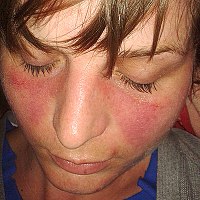
Roborovski hamster (Phodopus roborovskii) strain SH101 as a systemic infection model of SARS-CoV-2
Sign Up to like & getrecommendations! Published in 2021 at "Virulence"
DOI: 10.1080/21505594.2021.1972201
Abstract: ABSTRACT Severe acute respiratory syndrome CoV-2 (SARS-CoV-2) is currently causing a worldwide threat with its unusually high transmission rates and rapid evolution into diverse strains. Unlike typical respiratory viruses, SARS-CoV-2 frequently causes systemic infection by… read more here.
Keywords: roborovski hamster; infection; strain; sars cov ... See more keywords

Systemic infection exacerbates cerebrovascular dysfunction in Alzheimer’s disease
Sign Up to like & getrecommendations! Published in 2021 at "Brain"
DOI: 10.1093/brain/awab094
Abstract: See Huuskonen et al. (doi:10.1093/brain/awab168) for a scientific commentary on this article. Systemic infection exacerbates Alzheimer’s disease. In this postmortem study, Asby et al. provide evidence that it does so by raising the levels of… read more here.
Keywords: alzheimer disease; disease; infection exacerbates; exacerbates cerebrovascular ... See more keywords

Key Role of Capsular Polysaccharide in the Induction of Systemic Infection and Abortion by Hypervirulent Campylobacter jejuni
Sign Up to like & getrecommendations! Published in 2017 at "Infection and Immunity"
DOI: 10.1128/iai.00001-17
Abstract: ABSTRACT Campylobacter jejuni is a zoonotic pathogen, and a hypervirulent clone, named clone SA, has recently emerged as the predominant cause of ovine abortion in the United States. To induce abortion, orally ingested Campylobacter must… read more here.
Keywords: abortion; hypervirulent; infection; jejuni ... See more keywords

Corpus Callosum Growth and Neurodevelopmental Outcome Are Negatively Influenced by Systemic Infection in Very Low-Birth-Weight Infants
Sign Up to like & getrecommendations! Published in 2021 at "Journal of Child Neurology"
DOI: 10.1177/08830738211016239
Abstract: Systemic infection may negatively modulate the development of cerebral white matter and long-term outcome of neonates. We analyzed the growth of corpus callosum (using cranial ultrasonography) and neurodevelopment (Bayley Scales of Infant Development, Third Edition)… read more here.
Keywords: corpus callosum; growth; systemic infection;

Microbiota-induced peritrophic matrix regulates midgut homeostasis and prevents systemic infection of malaria vector mosquitoes
Sign Up to like & getrecommendations! Published in 2017 at "PLoS Pathogens"
DOI: 10.1371/journal.ppat.1006391
Abstract: Manipulation of the mosquito gut microbiota can lay the foundations for novel methods for disease transmission control. Mosquito blood feeding triggers a significant, transient increase of the gut microbiota, but little is known about the… read more here.
Keywords: mosquito; gut; malaria vector; matrix ... See more keywords

Protective role of host complement system in Aspergillus fumigatus infection
Sign Up to like & getrecommendations! Published in 2022 at "Frontiers in Immunology"
DOI: 10.3389/fimmu.2022.978152
Abstract: Invasive aspergillosis (IA) is a life-threatening fungal infection for immunocompromised hosts. It is, therefore, necessary to understand the immune pathways that control this infection. Although the primary infection site is the lungs, aspergillosis can disseminate… read more here.
Keywords: systemic infection; role; complement; aspergillus fumigatus ... See more keywords

Tomato Yellow Leaf Curl Virus V2 Protein Plays a Critical Role in the Nuclear Export of V1 Protein and Viral Systemic Infection
Sign Up to like & getrecommendations! Published in 2020 at "Frontiers in Microbiology"
DOI: 10.3389/fmicb.2020.01243
Abstract: Geminiviruses are an important group of circular, single-stranded DNA viruses that cause devastating diseases in crops. Geminiviruses replicate their genomic DNA in the nucleus and the newly synthesized viral DNA is subsequently transported to the… read more here.
Keywords: protein; nuclear export; infection; export protein ... See more keywords

Dependence on Mincle and Dectin-2 Varies With Multiple Candida Species During Systemic Infection
Sign Up to like & getrecommendations! Published in 2021 at "Frontiers in Microbiology"
DOI: 10.3389/fmicb.2021.633229
Abstract: More than 95% of invasive Candida infections are caused by four Candida spp. (C. albicans, C. glabrata, C. tropicalis, C. parapsilosis). C-type lectin-like receptors (CLRs), such as Dectin-1, Dectin-2, and Mincle mediate immune responses to… read more here.
Keywords: candida; candida spp; dectin; mincle ... See more keywords

The LysR-Type Transcription Regulator YhjC Promotes the Systemic Infection of Salmonella Typhimurium in Mice
Sign Up to like & getrecommendations! Published in 2023 at "International Journal of Molecular Sciences"
DOI: 10.3390/ijms24021302
Abstract: Salmonella Typhimurium is a Gram-negative intestinal pathogen that can infect humans and a variety of animals, causing gastroenteritis or serious systemic infection. Replication within host macrophages is essential for S. Typhimurium to cause systemic infection.… read more here.
Keywords: systemic infection; yhjc; transcription; infection ... See more keywords